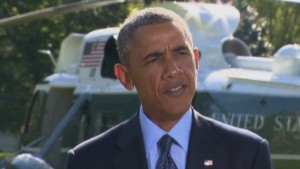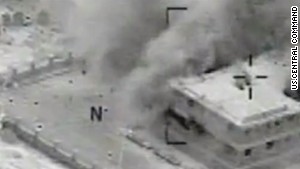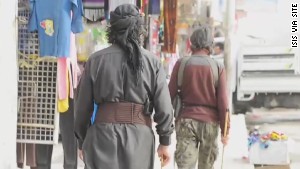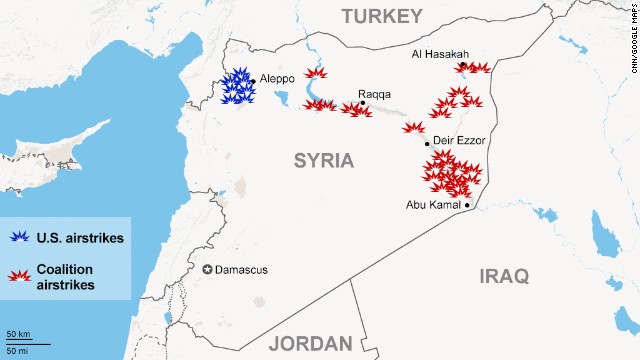19 reportedly killed as U.S., Arab allies pummel ISIS oil refineries
The latest wave of U.S.-led airstrikes aimed at choking off ISIS'
revenue killed at least 14 militants and five civilians in Syria, a
monitoring group said.







Among the targets hit
were an ISIS headquarters in Deir Ezzor province, a training camp and
several oil refineries, according to the dissident group Syrian
Observatory for Human Rights.
The U.S. military has not released details of the damage caused by the latest round of airstrikes.
But the Pentagon said these coalition attacks focused on pummeling mobile oil refineries used to fund the terror group.

Obama: This is not America's fight alone

U.S. attacks in Syria only the beginning

How much are strikes costing taxpayers?

What life is like inside ISIS stronghold
ISIS makes up to $2
million a day from the oil produced by the mobile refineries, Pentagon
spokesman Navy Rear Adm. John Kirby said.
Meanwhile, France
conducted new airstrikes in Iraq Thursday morning, French government
spokesman Stephane Le Foll told reporters in Paris.
France and the United
States began striking ISIS targets in Iraq before a U.S.-led coalition
starting bombing ISIS targets in Syria this week.
Kirby vowed that more U.S. attacks will come.
"This is the beginning of a long effort," he said. "There will be more."
Questionable impact
But military experts say airstrikes alone won't drain ISIS' money.
"Even if we stop their
oil flow today, they still have about a billion dollars in the bank,"
retired U.S. Army Col. Peter Mansoor said.
"They seized about a
third of a billion dollars from the central bank of Mosul (Iraq)." On
top of that, ISIS has garnered millions of dollars in ransoms from
European governments for hostages and have traded much of their oil,
Mansoor said.
And more challenges loom.
ISIS has likely
dispersed much of their command-and-control capabilities and leaders and
are now "mixed in with the civilian population," Mansoor said.
"So it's unlikely these
airstrikes have crippled ISIS," he said. "As the President has said,
it's going to be a long campaign, and it will be months -- perhaps years
-- before ISIS is dealt a serious blow absent any sort of ground force
to go in and root them out on the ground."
What all has been hit?
So far, officials have confirmed at least 198 strikes against ISIS targets in Iraq and 33 strikes against ISIS in Syria.

Activist: Airstrikes won't eliminate ISIS

U.S. strikes the Khorasan group in Syria

Map: Airstrikes in Syria
In the latest round
Wednesday targeting ISIS refineries in Syria, fighter jets from Saudi
Arabia and the United Arab Emirates flew alongside U.S. aircraft,
hitting 12 locations, Kirby said.
The U.S. military was
still assessing the outcome, but Kirby said "we are very confident we
hit what we were aiming at, and we caused the damage we wanted."
While ISIS has been the focus of most of the strikes in Syria, other terror targets have also been hit.
The U.S. military said the al Qaeda-linked Khorasan Group was also targeted when the strikes in Syria began Tuesday morning.
And the terror group
al-Nusra Front says its leader, Abu Yousef al-Turki -- also known as
"The Turk" -- was killed. But the United States has not said whether
al-Turki is dead.
"We cannot confirm any particular leadership that might have been killed in any of these strikes," Kirby said Wednesday.
And as far as how many ISIS militants have been killed, "we don't know that, either," Kirby said.
"The goal really was to get at ISIL's (ISIS') capabilities of sustaining, training, equipping, financing itself."
International support
Meanwhile, support for the the international coalition against ISIS in Iraq is growing.
The Dutch foreign
ministry announced Wednesday that its military will contribute six F-16
fighter jets and 250 troops to carry out airstrikes and train Iraqi and
Kurdish forces. Belgian Foreign Minister Didier Reynders said his
country's parliament will weigh a request for six of its fighter jets to
take part in the bombing campaign.
Similarly, British Prime
Minister David Cameron said he's recalling Parliament Friday "to secure
approval for the United Kingdom to participate in the Iraq air
campaign.
"The U.N. Security
Council has now received a clear request from the Iraqi government to
support it in its military action against ISIL," Cameron said from U.N.
headquarters in New York. "... So it is right that Britain should move
to a new phase of action."
Activist: ISIS fighters keep low profile
An activist from Raqqa, who uses the pseudonym Maher al-Ahmad, told CNN he'd gone back to the town after the airstrikes.
"It's the first time I
didn't see ISIS in the streets, that I was able to walk around, because I
am wanted by them," said al-Ahmad, who moves between Raqqa and Turkey's
Gaziantep province.
He said people who were there during the strikes described them as feeling like earthquakes.
Some 20 to 25 vehicles
filled with ISIS fighters, including people he believes were senior
leadership because of the level of security around them, left the city
within hours of the attacks, the activist said.
ISIS fighters began
moving into the homes of civilians in the past two to three weeks,
al-Ahmad said, raising fears that the civilians may be used as human
shields or fall victim to future airstrikes.
Hassan al-Halabi, an
activist from Aleppo, voiced similar fears, saying residents there have
two main concerns about upcoming strikes in Syria.
"The first is that they
are afraid of having civilian casualties because ISIS members and
fighters are among civilians," al-Halabi said.
"And the second concern
is that what will happen after that? Who will replace ISIS, especially
that the regime is ready to take control of ISIS' areas?"










0 comments:
Post a Comment